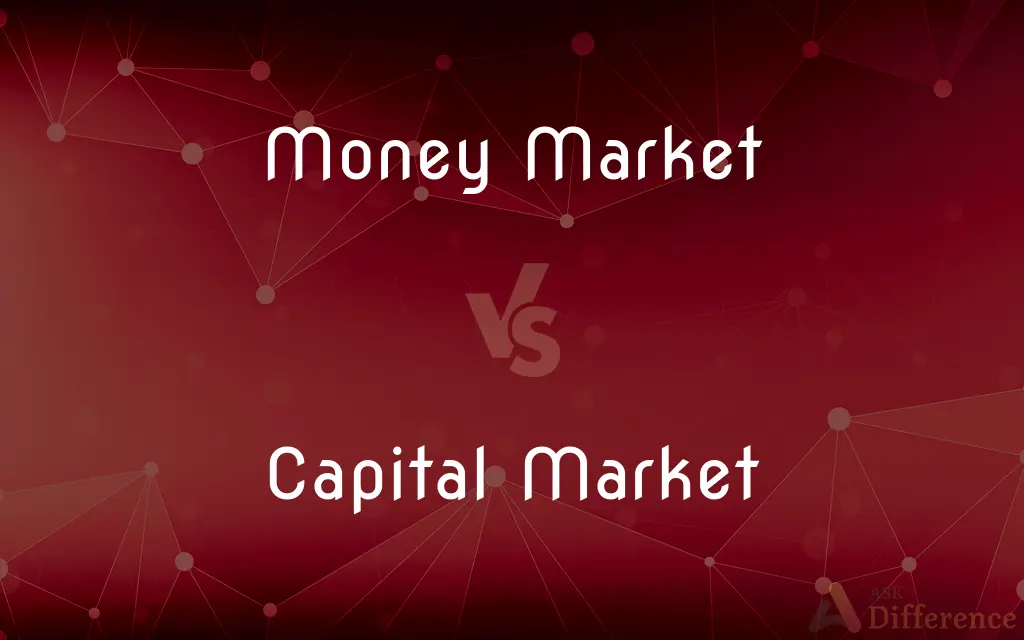Money Market vs. Capital Market — What's the Difference?
Edited by Tayyaba Rehman — By Fiza Rafique — Published on December 30, 2023
Money Market deals with short-term funds, while Capital Market deals with long-term investments.

Difference Between Money Market and Capital Market
Table of Contents
ADVERTISEMENT
Key Differences
Money Market is a segment of the financial market where short-term funds are borrowed and lent, typically with maturities of a year or less. Capital Market, on the other hand, facilitates the buying and selling of long-term financial instruments, often with maturities exceeding one year.
The instruments traded in the Money Market include treasury bills, commercial papers, and certificates of deposit. In contrast, Capital Market involves the trading of securities such as stocks and long-term bonds.
Money Market plays a critical role in providing liquidity and short-term financing to corporations and governments. In comparison, Capital Market provides a platform for entities to raise long-term funds and for investors to buy ownership or lend to these entities.
Money Market tends to be more liquid and less risky due to the short duration of its instruments. Capital Market, however, might carry a higher risk, given the long-term nature of its investments.
Both Money Market and Capital Market are essential components of a nation's financial system. While the Money Market helps in managing short-term cash needs, the Capital Market aids in long-term growth and capital formation.
ADVERTISEMENT
Comparison Chart
Nature of Investment
Short-term (typically up to 1 year)
Long-term (often exceeding 1 year)
Risk
Lower due to short duration
Higher due to long-term nature
Liquidity
Highly liquid
Varies, can be less liquid
Instruments
Treasury bills, commercial papers, certificates
Stocks, long-term bonds, debentures
Primary Role
Provide liquidity and short-term financing
Raise long-term capital and facilitate investments
Compare with Definitions
Money Market
A segment of the financial system where instruments mature in one year or less.
Short-term investors often prefer the Money Market due to its liquidity.
Capital Market
A financial market where long-term debt and equity-backed securities are traded.
Investors seeking long-term gains often look towards the Capital Market.
Money Market
The place where entities secure their short-term capital requirements.
With the upcoming expansion, the company turned to the Money Market for quick financing.
Capital Market
A market for long-term investments and securities.
Companies access the Capital Market to raise funds for expansions and projects.
Money Market
A segment where borrowing and lending of short-term funds take place.
The central bank's policy can influence the interest rates in the Money Market.
Capital Market
The venue where corporations and governments raise long-term funds.
Successful startups often transition to the Capital Market for substantial funding rounds.
Money Market
A market for short-term financial instruments.
Corporations often tap the Money Market to meet their immediate cash needs.
Capital Market
A platform facilitating the trade of long-duration financial instruments.
The stability of a country's Capital Market often reflects its economic health.
Money Market
The financial arena where high liquidity assets are traded.
Due to its high liquidity, the Money Market is considered less risky.
Capital Market
A segment of the finance industry focused on long-term financial asset transactions.
Many investment strategies revolve around the trends of the Capital Market.
Common Curiosities
How does a central bank's policy affect the Money Market?
Central bank policies can influence interest rates in the Money Market, affecting borrowing costs.
Can individual investors participate in the Money Market?
Yes, individuals can invest in the Money Market through instruments like money market funds.
What are the common instruments in the Capital Market?
Capital Market includes instruments like stocks and long-term bonds.
Can one earn higher returns in the Capital Market?
While the Capital Market can offer higher returns, it also comes with higher risks compared to the Money Market.
Why is the Money Market essential for corporations?
The Money Market provides corporations with a platform to manage their short-term liquidity and financing needs.
What is the primary difference between Money Market and Capital Market?
Money Market deals with short-term funds while Capital Market handles long-term investments.
How do government policies influence the Capital Market?
Government policies, regulations, and economic conditions can impact investor sentiment and activity in the Capital Market.
Is Money Market safer than Capital Market?
Generally, Money Market is considered less risky due to its short-term nature compared to Capital Market.
Is the stock market a part of the Capital Market?
Yes, the stock market is a significant component of the Capital Market.
How do economic downturns affect the Capital Market?
Economic downturns can lead to reduced investor confidence and activity in the Capital Market.
Why do companies issue stocks in the Capital Market?
Companies issue stocks in the Capital Market to raise long-term capital and expand their operations.
Are the instruments in Money Market highly liquid?
Yes, instruments in the Money Market are typically highly liquid.
Are mutual funds a part of the Capital Market?
Yes, mutual funds that invest in long-term securities are a part of the Capital Market.
Which market would be suitable for short-term investments?
For short-term investments, the Money Market is more suitable.
Can interest rates impact both Money Market and Capital Market?
Yes, interest rates can influence the borrowing costs in the Money Market and the valuation of securities in the Capital Market.
Share Your Discovery

Previous Comparison
Homonyms vs. HomographsAuthor Spotlight
Written by
Fiza RafiqueFiza Rafique is a skilled content writer at AskDifference.com, where she meticulously refines and enhances written pieces. Drawing from her vast editorial expertise, Fiza ensures clarity, accuracy, and precision in every article. Passionate about language, she continually seeks to elevate the quality of content for readers worldwide.
Edited by
Tayyaba RehmanTayyaba Rehman is a distinguished writer, currently serving as a primary contributor to askdifference.com. As a researcher in semantics and etymology, Tayyaba's passion for the complexity of languages and their distinctions has found a perfect home on the platform. Tayyaba delves into the intricacies of language, distinguishing between commonly confused words and phrases, thereby providing clarity for readers worldwide.













































